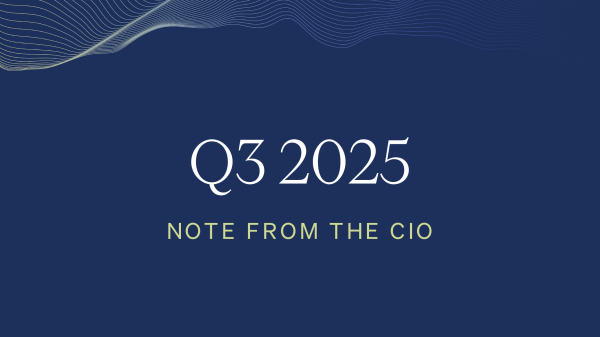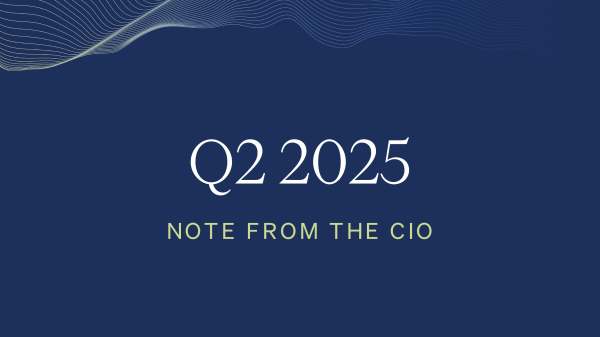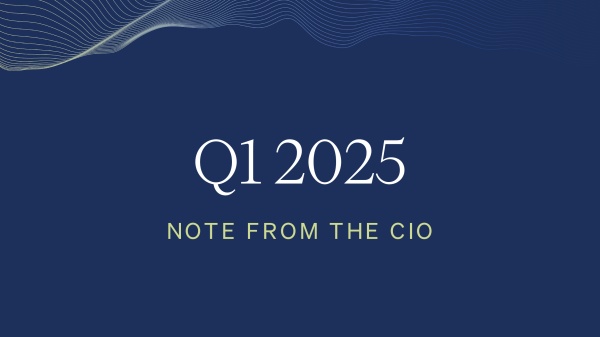Perspective on Election 2024 and the Markets
- Investment Management

Election years often stir up a range of emotions and uncertainty, leaving people concerned about how the outcome will affect their investments, money, and the overall market. According to Nationwide, “nearly one in three (32%) investors believe the economy will plunge into a recession within 12 months if the political party with which they least align gains more power in the 2024 federal elections.”
It’s natural to want to safeguard your finances during emotionally charged periods, especially when elections touch on deeply held beliefs and core identities. With the election only a month away, Quantum’s Chief Investment Officer Darius Gagne recently sat down with globally recognized speaker and investment expert Apollo Lupescu of Dimensional Fund Advisors to discuss this timely topic. You can view the full discussion here.
How will the upcoming election affect the markets and investors?
In their discussion, Darius and Apollo address the various concerns investors have raised about the upcoming election to shed light on common questions. Drawing on decades of research and evidence, Apollo shares data that suggests that the link between election outcomes and market performance is not as strong as investors may believe. While there may be short-term effects, Apollo shared that the markets are shaped by a myriad of factors with a single political party or president’s policies being just one element. They explored some key questions and topics as follows:
Do election years spell trouble for the markets?
- From 1926 to 2023, there have been 24 presidential election years; of those 24 years, we observed that 20 had positive market outcomes. Further, when looking closer at the four years where there were downturns (1932, 1940, 2000, 2008), we saw that the driver of the downturns were more likely related to significant global events happening during those times, such as:
- 1932 - the Great Depression
- 1940 - beginning of World War II
- 2000 - start of the Dotcom bust
- 2008 - the Great Financial Crisis
How does having a Republican or Democrat in the White House influence the markets?
- They shared that elections and politics tend to touch our deeply held beliefs, and so it can elicit strong emotions in people. However, when looking at the annualized market returns of the S&P 500 during past presidencies, from Nixon (R) to Obama (D) to Trump (R), it was not apparent that one party was better or worse for the markets.
- To take the analysis a step further, Apollo compared how the S&P 500 performed under a pro-business administration under Reagan versus an administration that was more focused on social programs under Obama. What he found was that the market returned 15.8% under Reagan and a nearly identical 16% under Obama.
- Apollo also shared how the market performed under periods of single party control. Between 1926 - 2020, the democrats had control of the presidency and congress a total of 34 years, and the republicans had control for 13 years. Surprisingly, the market produced an identical return of 14.52% in each of those periods of single party control.
How does a president’s policies shape market trends?
- There are times when the US government can be behind an industry such as the Trump (R) administration’s support of the U.S. steel industry by placing tariffs on foreign produced steel. In fact, leading up to the tariffs the stock of U.S. Steel Corp experienced a significant increase in price. However, by the end of his administration, the stock had lost most of its value. In another example, despite the Biden (D) administration’s focus on green energy, the stock of fossil fuel companies, such as ExxonMobil, have experienced a strong increase. So again, when we look at the data, it does not show a strong correlation between government support and the performance of a company’s stock.
- The takeaway here was one that brought the speakers back to a fundamental principle, which is to take a disciplined investment strategy that uses a well-diversified portfolio based on your financial plan and not headlines.
Does a particular party in office deserve credit or blame for market performance?
When reviewing the annualized market returns of the S&P 500 during George W. Bush’s (R) presidency, the market saw a 4.4% decline, while Clinton (D) experienced a 17.4% growth. However, we also know that Bush took office during the dot-com bust, while Clinton’s administration coincided with the tech boom. In both cases, the White House likely had little influence on the market’s rise or fall, but rather the global tech boom and ballooning dot-com bubble likely played more significant roles.
Is the national debt, which is at $34T, sustainable?
- Apollo defined the national debt as an imbalance between tax revenues and government spending, and shared his perspective from an economic lens.
- He shared that in 1990 our national debt was $4T, and 3.1% of US GDP went to paying the interest on this debt. In 2024, our national debt is at $34T, and 2.4% of US GDP went to paying interest on the debt. So in relative terms the current debt service is a smaller portion of our GDP than it was 34 years ago.
- In addition, interest rates for bonds are set by the markets and not governments. So the true way to compare the credit worthiness of a borrower is to see what the market is charging them to borrow. When comparing the bond yields for the US Government to large corporations, Apollo noted that the recent bond yield for the US Government is 4.6% compared to Apple at 5.2%, Ford at 7.8%, and Nordstrom at 9.5%.
- As a result, the data tells us that at the moment the market is signaling no discomfort around the US Government’s ability to repay its debts, and that its ability to repay is stronger than some of the largest US corporations.
- Fun fact: Did you know the very first publicly traded stock in the US started trading in 1792? The stock was for the Bank of New York, which is still traded today as BNYMellon on the NYSE.
As the discussion above has shown, the evidence does not support that the government has a significant impact on market performance or how well investors do.
Staying the Course Through Election 2024
Beyond the campaign rhetoric, scary headlines, and heated debates, investing is highly personal. So it is only natural that emotions can run high for investors during election years, causing them to potentially base their investment decisions on concerns, fears and opinions rather than facts. Darius and Apollo emphasize the importance of prioritizing “investment principles over emotions” when making portfolio and financial decisions, and shared data showing little indication that election years influence a positive or negative market performance, regardless of the outcome. The bottom line? Darius shared that we are lifetime investors in companies, who will always do what is necessary to maximize profits, and that is what we are investing in. Everything else is just noise.
Working with a financial advisor can help investors when navigating turbulent times. A trusted professional can offer valuable guidance and perspective to manage the risk of emotional decision-making, empathetically and objectively address concerns, and provide clarity on your financial plan. We encourage partnering with an advisor to develop a personalized plan that aligns with your long-term values and keeps you on track despite the political climate. Please contact our team if you’d like to learn more about how Quantum can assist you in your financial journey.
DISCLOSURE: Quantum Financial Advisors, LLC is an SEC registered investment adviser. SEC registration does not constitute an endorsement of Quantum Financial Advisors, LLC by the SEC nor does it indicate that Quantum Financial Advisors, LLC has attained a particular level of skill or ability. This material prepared by Quantum Financial Advisors, LLC is for informational purposes only and is accurate as of the date it was prepared. It is not intended to serve as a substitute for personalized investment advice or as a recommendation or solicitation of any particular security, strategy or investment product. Advisory services are only offered to clients or prospective clients where Quantum Financial Advisors, LLC and its representatives are properly licensed or exempt from licensure. No advice may be rendered by Quantum Financial Advisors, LLC unless a client service agreement is in place. This material is not intended to serve as personalized tax, legal, and/or investment advice since the availability and effectiveness of any strategy is dependent upon your individual facts and circumstances. Quantum Financial Advisors, LLC is not an accounting or legal firm. Please consult with your tax and/or legal professional regarding your specific tax and/or legal situation when determining if any of the mentioned strategies are right for you.
Please Note: Quantum does not make any representations or warranties as to the accuracy, timeliness, suitability, and completeness, or relevance of any information prepared by an unaffiliated third party, whether linked to Quantum’s website or blog or incorporated herein, and takes no responsibility for any such content. All such information is provided solely for convenience purposes only and all users thereof should be guided accordingly.
For more information about Quantum and this article, please read these important disclosures.
- Investment Management









